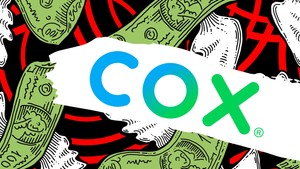Tech companies and trade bodies galore, not to mention the US government itself, have all filed papers with the US Supreme Court in support of Cox Communications as it tries to overturn the billion dollar music piracy judgement secured against it by the major record companies.
American internet service provider Cox was held liable for contributory copyright infringement for failing to tackle its music pirating customers, even after the major labels identified the internet connections being used to illegally access or share music files.
But the ISP insists that the lower courts were wrong to hold it liable for the infringement of its customers simply because it failed to disconnect those users based on copyright complaints from the labels. It argues that US Congress - when passing copyright law - never anticipated stretching liability for infringement this far. And to that end, the Supreme Court should reverse the previous rulings.
One of the lobbying groups backing Cox is Re:Create, which says, “If there was ever a case where the courts should act cautiously before expanding the scope of copyright contributory liability, it’s this one”.
Cox is an ISP “upon which millions of innocent users rely for internet access, a vital service in today’s society”, it adds. But, if the major labels’ “expansive view of copyright contributory liability” is adopted, ISPs would have to “terminate their customers’ internet access upon the flimsiest of accusations - especially since ISPs would face billion-dollar statutory damages awards if they didn’t do so”.
And terminating someone’s internet account - even if they are actually liable for copyright infringement - is a very big deal, many of Cox’s supporters are keen to stress. Another organisation backing Cox - the Copia Institute, a think tank set up by the team behind tech website Techdirt - raises the ‘Packingham problem’ in its filing with the Supreme Court.
That relates to the Supreme Court ruling in the case Packingham v North Carolina, in which - it writes - judges ruled that “being kept off the internet is too severe a penalty even for adjudicated criminals who have caused tangible harm to the physical well-being of their victims”.
Copyright infringement is usually a civil rather than criminal matter. And yet if the Cox ruling stands, the Copia Institute argues, the ISP will be forced to disconnect internet users based on copyright complaints from record companies.
“To allow such a penalty here”, it claims “one that this court already deemed intolerable in circumstances far more consequential, would yield the absurd result of effectively treating copyright infringement as a worse offence than some of the world’s most heinous crimes”.
In its own legal filings, including with the Supreme Court, Cox has made all sorts of doom and gloom predictions about how many users will lose their internet connections if the ruling in this case stands, including lots of users who have never actually accessed or shared pirated music files.
That’s on the basis that copyright complaints from labels often relate to internet connections used by cafes or colleges or military barracks, so terminating the infringer will also mean cutting off many other internet users. Even if it’s a domestic internet account identified by the label, Cox has previously stated, maybe “Junior” is the infringer and then “grandma” loses her internet connection.
The majors have repeatedly rejected all the doom and gloom predictions made by Cox and its allies. The music companies argue that the lower courts were right to hold Cox liable for infringement after it was shown that the ISP had deliberately shoddy systems for dealing with copyright infringing customers, despite being aware of all the music piracy happening on its networks.
The American Intellectual Property Law Association has submitted a filing with the Supreme Court supporting the majors’ position, but most of the so called ‘amicus briefs’ filed with the top US court on Friday were supporting Cox.
That includes filings from most of Cox’s ISP rivals, tech giants Google, Amazon and Microsoft, social media companies X and Pinterest, and an assortment of trade bodies and lobbying groups including the Computer & Communications Industry Association, the American Library Association and the Electronic Frontier Foundation.
The US government came out in support of Cox in this dispute earlier this year, initially urging the Supreme Court to review the case. In its new filing with the top court, the US Department Of Justice says that previous rulings in this case constitute a “expansive view of contributory copyright infringement” which “cannot be reconciled” with previous judgements in the Supreme Court.
“In both copyright and patent cases, ‘mere knowledge of actual infringing uses’ is an insufficient basis for imposing secondary liability on the seller of goods or services that are used to commit infringement”, it argues, citing the judgement in the big file-sharing copyright case involving P2P network Grokster.
Meanwhile, “under the common law of aiding and abetting more generally, an ordinary merchant’s knowledge that a specific customer plans to misuse its product, standing alone, does not demonstrate culpable intent to participate in that misuse”.
“In this case”, it then argues, “the evidence demonstrated at most that Cox was indifferent to its subscribers’ infringement, not that Cox intended to participate in that infringement or wished to bring it about”. Therefore it shouldn’t be held liable for that infringement.
We await to see how the majors respond to this barrage of support in favour of Cox as they seek to hold on to their billion dollar damages, and a ruling that ensured ISPs had a more proactive role to play in combating online piracy in the US.

